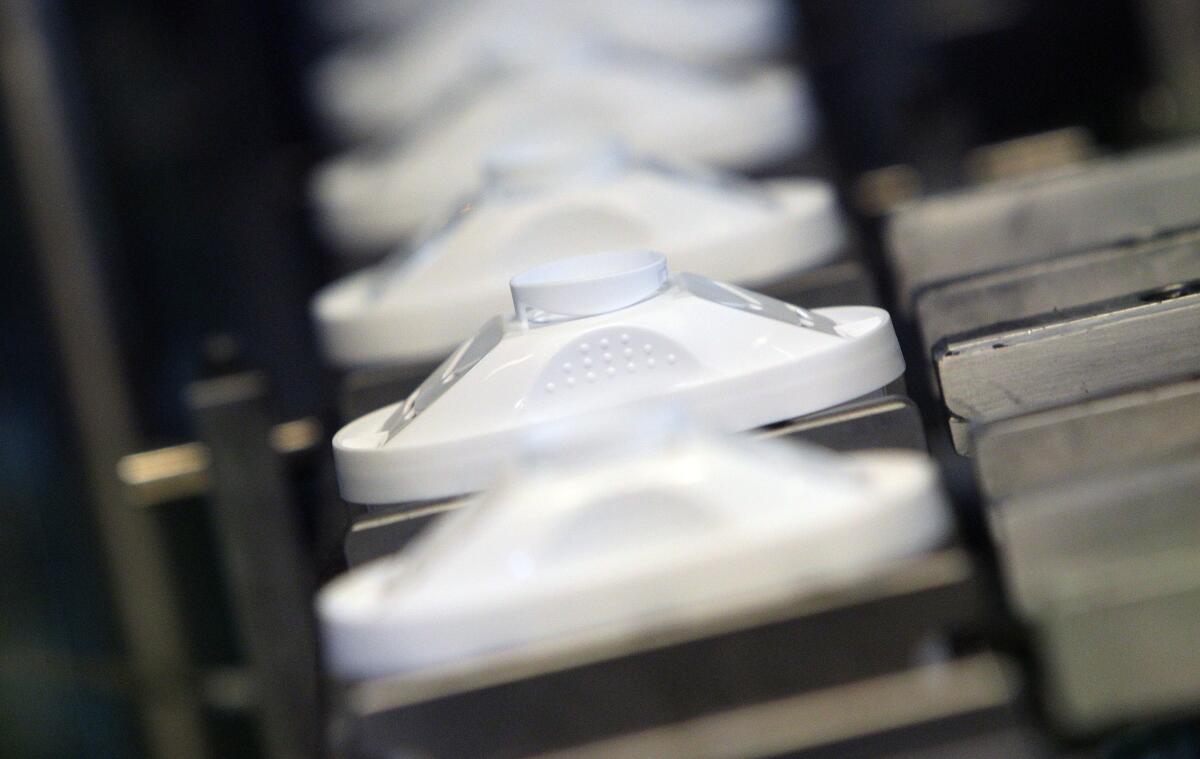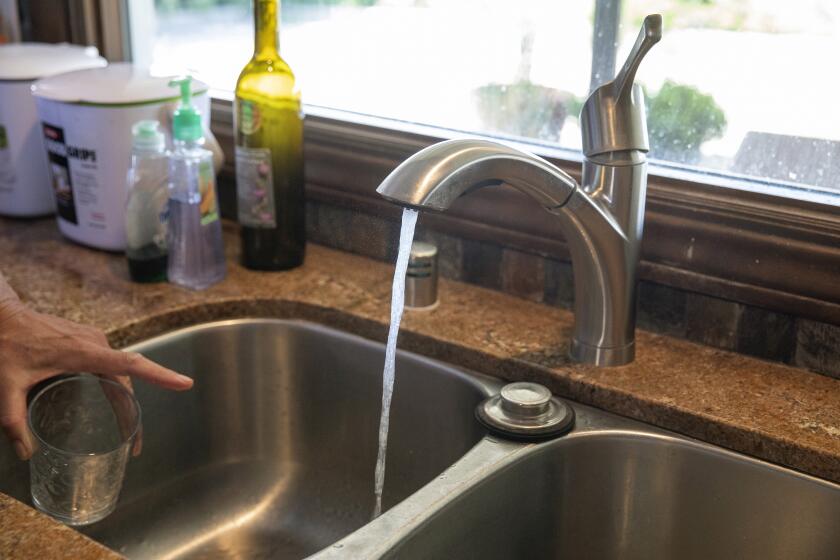Brita water filter company accused of false advertising

- Share via
A lawsuit filed against the maker of some of the nation’s most popular water filtration systems has accused the Brita company of falsely advertising that its products remove or reduce hazardous contaminants from tap water.
The proposed class-action lawsuit, which was filed Wednesday in Los Angeles County Superior Court, claims that deceptive advertising has led customers to falsely believe that Brita products filter such contaminants as arsenic, nitrate, hexavalent chromium and certain PFAS, or “forever chemicals,” from tap water.
Brita is owned by Clorox Co., which is headquartered in Oakland. Clorox released a statement Wednesday saying it was still reviewing the complaint, but looked forward to “defending ourselves vigorously.”
“Brita takes the transparency of the variety of water filtration options we offer seriously,” the statement said. “Our products include a standard filtration option that improves taste and odor of tap water and is certified to reduce identified contaminants as communicated. For those consumers looking for water filters certified to reduce PFOS or PFOA, the Brita Elite pour-through and Brita Hub are both certified to reduce PFOS/PFOA, as well as lead and other identified contaminants.”
At least 45% of the nation’s tap water is estimated to have PFAS ‘forever chemicals,’ with urban residents more likely to be exposed, new research says.
The lawsuit was filed by Los Angeles County resident Nicholas Brown, who is currently the sole plaintiff. Brown purchased a Brita water pitcher and standard filter for about $15 in 2022 after reading the product label and believing the device would filter contaminants to below lab detectable limits, the lawsuit said.
“Unfortunately, the Products are not nearly as effective as defendant deliberately leads people to believe, causing consumers to overpay millions and forego more effective alternatives,” the lawsuit said. “In this way, defendant has not only bilked millions of dollars from consumers in ill-gotten gains, but Defendant has put the health and welfare of millions of consumers and their families at risk.”
At the heart of the lawsuit is the basic and fundamental human right to clean and safe drinking water, said the plaintiff’s lawyers. They argue that Brita products, which are widely available and affordable, are a staple in the homes of students, renters, working families and others who can’t spare the price of high-quality filters for their taps.
The company’s marketing “creates the illusion of safety and protection for people and their families,” said Ryan Clarkson, managing partner of the Clarkson Law Firm in Malibu. “And that’s really the big problem that we need to solve here. When people are running their tap water with PFAS through these Brita water filters, it’s just a superfluous act. It does nothing whatsoever as it relates to chemicals like PFAS.”
PFAS, or per- and polyfluorinated substances, are a group of thousands of manufactured chemicals that have been widely used for decades in products that resist heat, oil and water. They can be found in such everyday items as nonstick cookware, dental floss, period underwear, fast food boxes, water-repellent clothing and firefighting foam.
Known as forever chemicals because they don’t degrade naturally in the environment, PFAS have made their way into rivers, lakes, aquifers and people’s blood streams. Exposure to high levels of some PFAS has been linked to adverse health effects such as decreased fertility, increased risk of high cholesterol, obesity, high blood pressure, certain cancers, and liver and immune-system damage.
The lawsuit accuses the company of violating California laws concerning unfair competition, false advertising, breach of contract and others. It seeks damages and other remedies.
Firefighting foam left water polluted with PFAS chemicals near San Luis Obispo’s airport. Residents hope plans to deliver clean water move quickly.
Depending on the type of filter, Brita products are certified to reduce or remove contaminants such as chlorine, lead, mercury, asbestos, some particulates, zinc, copper and select pesticides, herbicides and pharmaceuticals, according to its website.
The lawsuit comes at a time of increasing concern over drinking water contamination.
Researchers recently estimated that at least 45% of the nation’s tap water is contaminated with one or more PFAS chemicals, and that drinking-water exposures may be more common in urban areas across Central and Southern California than in other regions.
The Environmental Protection Agency plans to begin regulating several types of PFAS in drinking water and has proposed strict limits on two common ones — PFOA and PFOS — and L.A. County supervisors supported a proposal last month to investigate PFAS levels in drinking water.
Arsenic and nitrate, which are linked to certain cancers and other health issues, are also widespread in parts of California. According to state data, 22% of primary maximum contaminant level (MCL) violations in public water systems last year were for arsenic, and 22% were for nitrate, the highest of any contaminants. MCLs are health-protective drinking-water standards.
The lawsuit argues that claims on the labels and packages of certain Brita water filters, pitchers and dispensers — such as “Cleaner, Great-Tasting Water for Over [20, 25, or 30] Years,” “The #1 FILTER” and “Reduces 3X Contaminants” — are false and misleading. Other claims like “Better water for you. Better water for the planet” and “Fresh filter = Fresh water” reinforce consumer beliefs that the products remove or reduce to below lab detection limits common hazardous contaminants, the lawsuit says.
The lawsuit also claims that numerous Brita products have not been registered with the California State Water Resources Control Board since they’ve been marketed and sold, and that none of their products have been certified to remove or reduce health-hazardous contaminants, making it unlawful to market and sell them in the Golden State.
“What the case seeks is really two things,” Clarkson said. “First, greater transparency for consumers so they understand what these water filters are capable of filtering out and what they are not capable of filtering out. We don’t believe that the advertising and labeling of these products communicate in a transparent and effective way to consumers what the products can and can’t do.
“And secondly, we’re looking for compensation to all purchasers of these products who have relied upon the products to fulfill a promise that they simply haven’t fulfilled,” he added. The class period will go back to Aug. 16, 2019.
More to Read
Sign up for Essential California
The most important California stories and recommendations in your inbox every morning.
You may occasionally receive promotional content from the Los Angeles Times.













